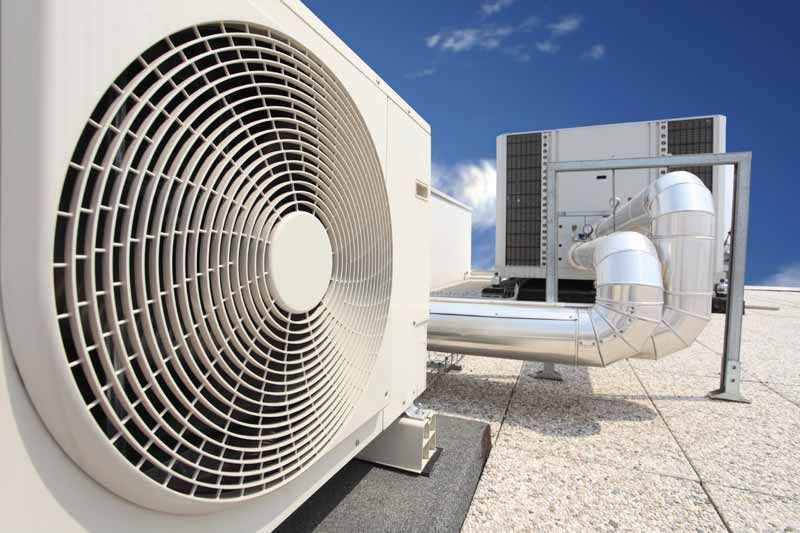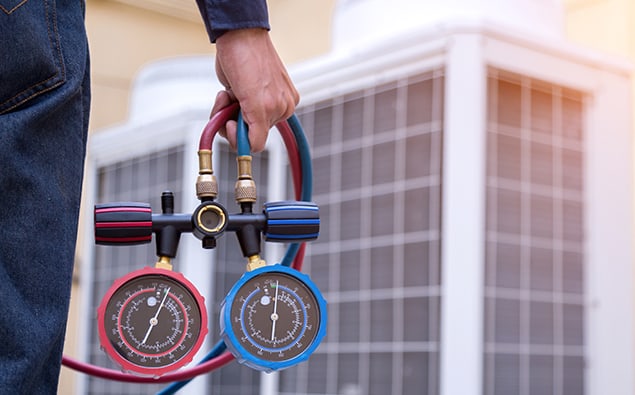Recognizing HVAC: A Comprehensive Guide to Home Heating, Ventilation, and A/c Provider
In today's swiftly evolving world, an essential understanding of cooling and heating systems is no more a luxury yet a need for ensuring optimum indoor atmospheres. This overview provides a complete exploration of ventilation, heating, and air conditioning services, debunking the intricate interplay of elements that control convenience and performance. As we browse via the details of choosing the appropriate system and keeping it for peak efficiency, one starts to understand the profound effect these systems carry power consumption and sustainability. What usual risks could be threatening your a/c system's potential without your expertise?
Essentials of A/c Systems
Home Heating, Ventilation, and Cooling (COOLING AND HEATING) systems are pivotal elements in modern-day style, continually making sure optimum interior air top quality and thermal convenience. These systems are essential to maintaining the health, performance, and wellness of residents in domestic, business, and industrial settings. At their core, a/c systems are made to regulate the temperature, humidity, and cleanliness of air, developing a comfortable atmosphere no matter external climate condition.
The standard parts of a Cooling and heating system consist of heating systems, air flow air ducts, and air conditioning devices. Air flow, an essential facet of the system, involves the exchange of outside and interior air, controlling and lowering interior toxins dampness degrees.

Picking the Right Heating And Cooling System
Choosing a cooling and heating system entails a mindful balance of price, viability, and effectiveness to the particular requirements of a building. The selection procedure begins with an evaluation of the building's dimension, style, and meant usage. Larger frameworks may call for even more robust systems, while household structures might benefit from smaller sized, more energy-efficient designs. It is necessary to think about the climate of the place, as this will affect the sort of system that ideal maintains comfy interior temperature levels throughout the year.
Power performance ratings, such as SEER (Seasonal Energy Efficiency Proportion) for ac unit and AFUE (Annual Gas Application Effectiveness) for furnaces, are essential variables when assessing prospective systems. Greater scores typically show much better efficiency and reduced operating prices in time. In addition, prospective buyers need to compare ahead of time costs with possible long-lasting financial savings to figure out the very best economic alternative.
Another vital factor to consider is the kind of system-- whether a central system, split system, or ductless mini-split is ideal. Each offers distinctive advantages and restrictions, reliant on installment complexity and room needs. Examination with HVAC specialists is advisable to ensure that the system chosen lines up with both the building's specifications and the passengers' convenience preferences.
Relevance of Regular Maintenance
Once the appropriate heating and cooling system is chosen and set up, keeping its efficiency and long life becomes a top priority. Routine maintenance is necessary for ensuring that the system runs at peak efficiency, minimizing the risk of unforeseen malfunctions. Routine assessments and maintenance can determine possible concerns before they intensify right into expensive repairs or substitutes, consequently extending the life-span of the equipment.

In addition, sticking to an upkeep timetable can maintain the warranty insurance coverage, as many suppliers call for proof of regular maintenance to honor guarantee claims. Engaging specialist a/c specialists for regular upkeep makes sure that all components are evaluated accurately and adjusted as required. This positive method not just safeguards the financial investment in the HVAC system yet likewise promotes a healthier interior atmosphere for occupants, improving general wellness.
Enhancing Energy Efficiency
To boost power performance in heating and cooling systems, it is crucial to apply methods that lessen energy usage while preserving ideal performance. One reliable technique is the combination of wise thermostats, which permit exact control over temperature setups based upon tenancy and time of day. These tools can find out patterns and change home heating and cooling down routines as necessary, reducing unnecessary energy use.
An additional technique involves routine inspection and cleansing of a/c parts, such as air filters, coils, and ductwork. Clean systems run extra efficiently, as dust and particles can obstruct airflow and compel the system to function harder, eating even more power. Guaranteeing proper insulation and securing is additionally essential, as it avoids energy loss and decreases the tons on a/c systems.
In addition, upgrading to energy-efficient tools, such as variable-speed motors and high-efficiency compressors, can significantly reduce energy intake. These parts adjust their rate and outcome to match the details home heating or cooling need, stopping power waste.
Spending in energy healing air flow systems can also boost effectiveness by exchanging warmth between outward bound and incoming jet stream, decreasing the requirement for additional heating or air conditioning. By taking on these steps, cooling and heating systems can accomplish superior energy effectiveness, causing decreased operational prices and environmental influence.
Troubleshooting Common Issues
When attending to heating and cooling system breakdowns, an organized method to repairing can efficiently identify and settle usual problems. The primary step entails checking the thermostat setups to ensure they are correct and operating. Usually, dead batteries or wrong settings can trigger the system to act unevenly. Next, take a look Full Article at the air filters. Clogged up or unclean filters limit airflow, minimizing system performance and might lead to overheating or cold.
Evaluate the circuit breakers and merges; stumbled breakers or blown fuses can halt system procedures. In addition, take a look at the outside system for any obstructions or debris that can hinder efficiency. Normal upkeep of these components can protect against lots of typical issues.
Pay attention for unusual noises, which may indicate mechanical concerns such as damaged belts or electric motor troubles. Inexplicable rises in energy costs can also indicate underlying inadequacies or leaks in ductwork. Ensure that all vents are unhampered and open to help with optimum airflow.

Expert treatment becomes needed if these steps do not settle the issue, especially for intricate problems like refrigerant leakages or electric faults. Routine assessments and maintenance by certified technicians can preemptively address prospective issues, making sure the heating and cooling system runs effectively and reliably.

Conclusion
To conclude, a complete understanding of a/c systems is important for making certain optimal interior comfort and air quality. By choosing the appropriate system based upon details building requirements, the performance and sustainability of air, heating, and air flow conditioning solutions can be maximized. Regular maintenance is vital for maintaining system efficiency and longevity, while energy efficiency can be substantially improved with notified methods. Addressing usual problems with reliable repairing further guarantees the dependable operation of heating and cooling systems, profiting both house owners and companies.
As we navigate through the details of selecting the ideal system and preserving it for peak performance, one starts to understand the profound effect these systems have on energy intake and sustainability.Heating, Ventilation, and Air Conditioning (HVAC) systems are crucial parts in modern design, continually making certain optimal interior air high quality and thermal convenience (Plumber in Brownwood TX).Another essential consideration is the kind of system-- whether a central system, split system, or ductless mini-split is proper. Tidy systems run much more effectively, as dust and particles can obstruct airflow and force the system to work harder, taking in more power.In final thought, a thorough understanding of Cooling and heating systems is important for ensuring optimal interior convenience and air top quality